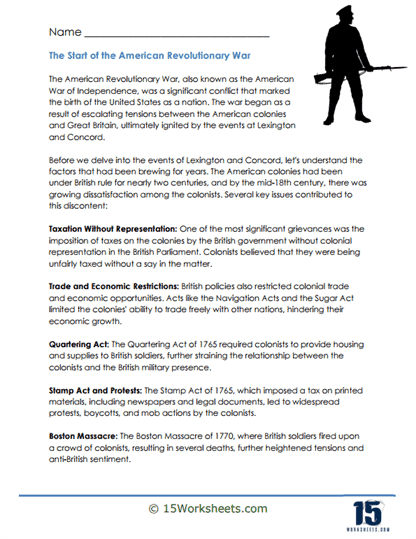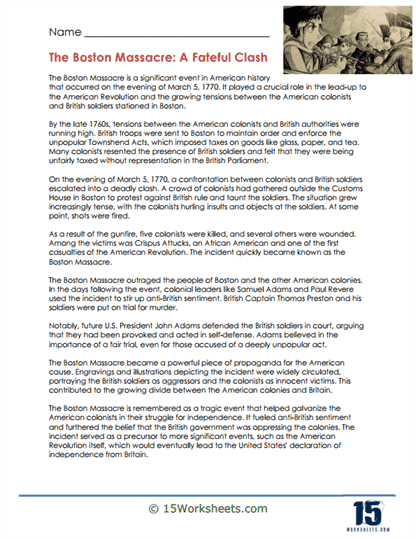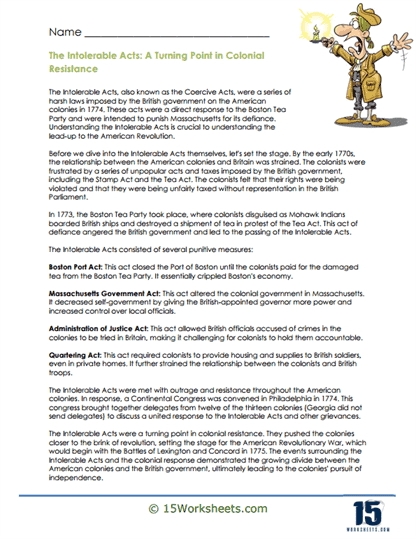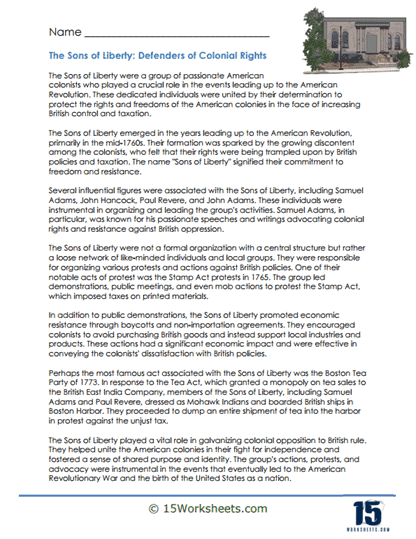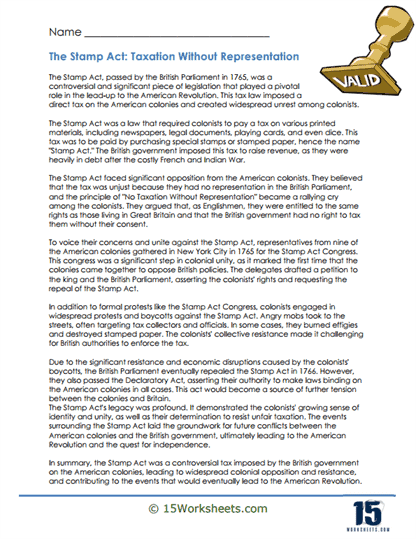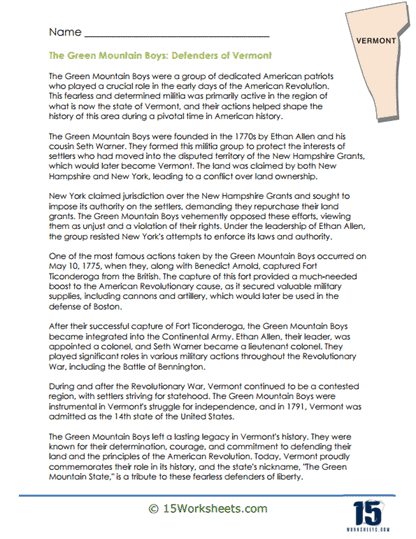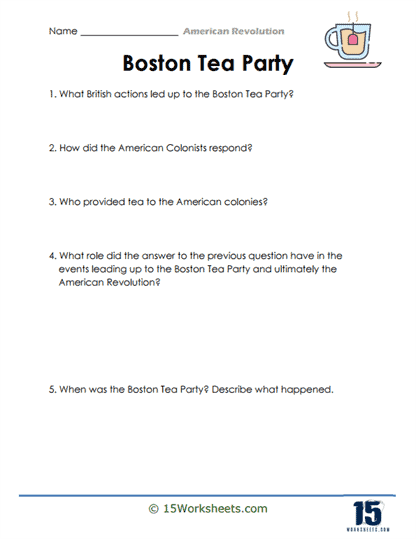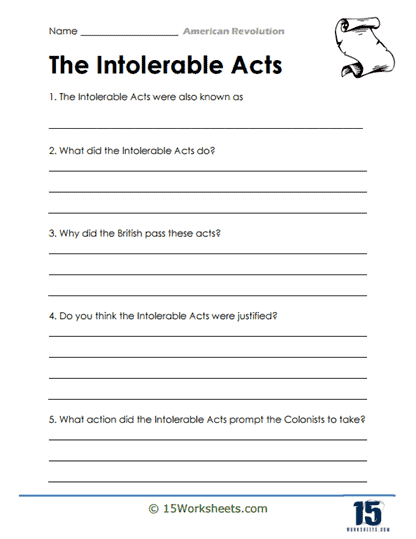American Revolution Worksheets
About These 15 Worksheets
These worksheets will help students learn about one of the most critical events in American history-the American Revolution. These worksheets are typically used in classrooms to reinforce lessons on the causes, events, and consequences of the Revolution, providing a structured way for students to engage with historical content. While primarily focused on history, these worksheets also serve as a valuable resource for improving reading and language arts skills, offering opportunities for students to practice reading comprehension, vocabulary, and analytical writing. By integrating history and language arts, American Revolution worksheets help students build a well-rounded understanding of the past while honing essential academic skills.
One of the most significant benefits of these worksheets is how they help students improve their reading and language arts abilities. Reading passages about key events like the Boston Tea Party or the signing of the Declaration of Independence expose students to complex historical texts, requiring them to read closely and critically. These worksheets typically include a range of questions that challenge students to summarize, analyze, and interpret the material they’ve read, which develops their reading comprehension. As they work through these passages, students also encounter new vocabulary-words like “tyranny,” “patriot,” or “independence”-which broadens their language proficiency and enhances their ability to engage with historical topics.
They also encourage students to think critically about the information they are studying. Exercises that ask students to compare different viewpoints, such as those of the Loyalists and Patriots, or analyze the significance of documents like the Declaration of Independence, help them practice persuasive writing and argumentation. These activities strengthen their ability to form well-supported opinions and articulate them clearly, which is crucial for developing writing skills. By analyzing primary sources and drawing connections between historical events, students not only learn about history but also sharpen their ability to interpret texts and communicate ideas effectively.
Types of Exercises
Our American Revolution worksheets include a variety of exercises designed to deepen students’ understanding of the Revolution while enhancing their academic skills. One of the most common types of exercises is reading comprehension passages, where students are given excerpts from historical texts, speeches, or summaries of key events. After reading, they answer questions that test their understanding of the material, requiring them to identify main ideas, make inferences, and draw conclusions. These questions not only check students’ historical knowledge but also promote critical reading and analysis.
Multiple-choice questions are another common feature of these worksheets. These questions test students’ factual knowledge of the Revolution, covering key dates, figures, and events. For example, students might be asked to identify who led the Continental Army (George Washington) or when the Declaration of Independence was signed (1776). While multiple-choice questions focus on memorizing facts, they also require students to recall information accurately, which is a vital skill for both history and reading comprehension.
In addition to reading and recall-based exercises, many worksheets include fill-in-the-blank activities. These exercises often focus on key vocabulary or important historical concepts. For example, students might be asked to complete sentences like “The Battle of ___________ was a turning point in the American Revolution,” requiring them to recall specific information, such as “Saratoga.” These exercises reinforce vocabulary knowledge and help students develop a stronger understanding of how specific terms and events fit into the larger narrative of the Revolution.
Another common task is timeline creation, where students are asked to place major events of the Revolution in chronological order. Timelines help students grasp the sequence of events and understand how one event led to another. For instance, they might plot the Stamp Act, Boston Massacre, and signing of the Treaty of Paris, seeing the progression from conflict to independence. This type of exercise encourages students to think about the cause-and-effect relationships in history, an essential skill for both historical analysis and logical thinking in language arts.
Primary source analysis is a particularly engaging exercise found on these worksheets. Students are provided with primary documents from the era, such as letters from soldiers, speeches by revolutionary leaders, or official government documents like the Declaration of Independence or the Articles of Confederation. Analyzing these sources allows students to engage directly with historical voices and understand the perspectives of people who lived through the Revolution. For example, a worksheet might ask students to analyze a letter from George Washington to his troops, prompting them to infer his motivations and leadership style. This not only deepens their historical understanding but also improves their ability to analyze and interpret texts-a crucial skill in language arts.
Another effective exercise is comparative analysis, where students are asked to compare the American Revolution with other revolutions, such as the French or Latin American revolutions. This activity encourages students to think critically about the similarities and differences between these historical movements. By analyzing factors like leadership, causes, and outcomes, students gain a deeper understanding of the broader context of revolutionary movements while refining their ability to compare and contrast-a skill that is highly useful in both writing and critical thinking.
Importance of Studying the American Revolution
The American Revolution stands as a defining moment in the history of not just the United States, but also the world. By understanding this period, students can gain valuable insights into the origins of their nation’s government, values, and institutions. However, learning about the American Revolution is more than simply memorizing dates or facts; it’s about grasping the complex ideas of liberty, democracy, justice, and civic responsibility that emerged from the conflict. Worksheets designed around this period offer an engaging way for students to explore these topics, encouraging a deeper connection to the material and helping them see how the past continues to influence the present.
Building a Foundation of Democratic Values
At the heart of the American Revolution were principles that continue to shape American identity today-liberty, equality, and the pursuit of happiness. Through carefully crafted worksheets, students can delve into these foundational values by analyzing pivotal documents like the Declaration of Independence. For instance, a worksheet that breaks down Thomas Jefferson’s famous words “We hold these truths to be self-evident, that all men are created equal,” invites students to explore the radical nature of this statement in the 18th century. They can then compare these ideas to modern debates around equality and human rights, drawing connections between historical ideals and contemporary struggles for social justice.
This process of examining foundational documents and ideas helps students understand not only what liberty and democracy meant to the Founding Fathers but also how these concepts have evolved. Students are able to see how the ideals of the Revolution were aspirational-setting the stage for ongoing debates about freedom and equality. For instance, students might analyze how the idea of liberty in the 1770s contrasts with the limitations faced by women, Indigenous peoples, and enslaved Africans at the time, sparking discussions on the complexities of applying these principles universally.
Understanding Historical Context
One of the most valuable aspects of studying the American Revolution is that it provides essential context for the formation of the United States and the challenges the new nation faced. Worksheets focused on key events, such as the battles of Lexington and Concord or the signing of the Treaty of Paris, can help students piece together the sequence of events that led to independence. By mapping out timelines or engaging in role-playing activities, students are encouraged to think about how the decisions made during the Revolution shaped the early Republic and its struggles for stability.
For example, a worksheet that asks students to put themselves in the shoes of a Continental Army soldier or a Loyalist merchant can foster a more personal understanding of the stakes involved in the conflict. This type of activity forces students to consider the diverse perspectives that existed at the time, moving beyond a simplified narrative of patriots versus tyrants. In doing so, students begin to see the Revolution as a complex and multifaceted struggle, not just a single event, but a movement that was influenced by global politics, economic pressures, and social dynamics.
Fostering Civic Engagement and Responsibility
Studying the American Revolution isn’t just about understanding history; it’s also about developing a sense of civic duty. The leaders of the Revolution-figures like George Washington, Thomas Jefferson, and Benjamin Franklin-challenged established norms and fought for a new form of government. Worksheets that encourage students to examine the debates and writings of these figures can prompt reflection on their own roles in society. How do the ideas of these early leaders resonate in today’s world, where democracy continues to face challenges?
Worksheets that feature primary source documents, such as Jefferson’s “Virginia Statute for Religious Freedom” or excerpts from Franklin’s writings, allow students to engage with the material on a deeper level. They might be asked to debate the merits of the arguments presented or consider how they would respond to the same issues in a modern context. This encourages not only critical thinking but also an understanding that democratic participation and civic responsibility are ongoing processes. By connecting the past to the present, students can begin to see themselves as active participants in the continuing story of American democracy.
Enhancing Critical Thinking Skills
Analyzing the causes and effects of the American Revolution is an excellent exercise in developing critical thinking. Rather than presenting history as a straightforward narrative, worksheets can encourage students to explore multiple perspectives. For example, students might be asked to compare British and colonial viewpoints on taxation, or to evaluate the effectiveness of different Revolutionary strategies. This kind of comparative analysis helps students understand that historical events are rarely black and white, and that leaders often faced complex choices.
A well-designed worksheet might challenge students to look at the long-term consequences of decisions made during the Revolution. For instance, the decision to exclude enslaved individuals from the promises of liberty and equality had profound ramifications for the future of the United States. By examining these contradictions, students can better appreciate how the nation has grappled with its ideals versus its realities. This type of analysis not only enhances historical understanding but also builds essential skills in reasoning, argumentation, and evidence-based thinking.
Encouraging Cultural Awareness
The cultural and ethical implications of the American Revolution are just as significant as its political outcomes. Many worksheets on the Revolution invite students to reflect on the moral and ethical debates of the time, such as the issue of “taxation without representation,” the ethics of colonial rebellion, and the treatment of Indigenous peoples. These discussions are vital, as they teach students to think critically about the role of power, justice, and ethics in shaping history.
The Revolution’s influence on American culture is profound. Literature, art, and even music from the period can be explored through worksheets that highlight how artists and writers responded to the events around them. For example, students might examine Revolutionary War propaganda or the early American paintings that celebrated the founding of the nation. By doing so, they gain an appreciation for how cultural expressions both reflected and shaped public sentiment during this critical period.
Gaining a Global Perspective
While the American Revolution is often taught as a domestic event, it had a far-reaching impact on the world stage. Many of the principles that emerged from the Revolution-such as the idea of self-determination and the rejection of monarchy-had profound influences on other independence movements around the globe. Worksheets that encourage students to examine the global repercussions of the Revolution can expand their understanding of its significance beyond the borders of the United States. For instance, the French Revolution, the Haitian Revolution, and various independence movements in Latin America were all influenced, at least in part, by the American struggle for freedom.
Lessons in Leadership, Strategy, and Perseverance
The figures of the American Revolution also offer timeless lessons in leadership and strategy. Through worksheets that examine the strategies of George Washington or the diplomatic skills of Benjamin Franklin, students can explore what makes an effective leader. They might analyze key battles like Yorktown or Saratoga to understand the strategic decisions that led to victory. Such exercises not only bring the history of the Revolution to life but also offer students valuable lessons in perseverance, problem-solving, and leadership—skills that are applicable in many areas of life today.
What Was the American Revolution?
The American Revolution was a significant political and military conflict between the thirteen British colonies in North America and Great Britain that lasted from 1775 to 1783. The roots of the Revolution lay in the growing dissatisfaction among colonists with British policies, particularly the imposition of taxes without representation in the British Parliament. This principle, famously encapsulated in the phrase “no taxation without representation,” became a rallying cry for colonial resistance. Key events, such as the Boston Tea Party in 1773, where colonists protested the Tea Act by dumping British tea into Boston Harbor, escalated tensions. The British government responded with harsh measures, leading to further unrest. This culminated in the first battles of the Revolution at Lexington and Concord in April 1775, marking the beginning of armed conflict between colonial militias and British forces.
As the war progressed, the colonies formally declared their independence from Britain on July 4, 1776, with the signing of the Declaration of Independence, a document largely authored by Thomas Jefferson. This declaration laid out the colonists’ grievances and their philosophical justification for seeking independence, emphasizing the inherent rights of individuals to life, liberty, and the pursuit of happiness. The war itself saw major battles, such as those at Saratoga and Yorktown, with the latter proving decisive in 1781 when British General Cornwallis surrendered to American and French forces. The American colonies, with support from France and other European allies, were able to successfully challenge the might of the British Empire, eventually winning their independence through perseverance, military strategy, and diplomatic efforts.
The American Revolution was not just a military conflict; it was also a profound ideological shift that transformed the political landscape of the new nation. It led to the creation of the United States, a country founded on principles of self-governance, democracy, and individual rights. The Revolution also had lasting global repercussions, inspiring other nations, such as France and Haiti, to pursue their own struggles for independence. In the years following the war, the newly formed United States faced the challenge of creating a stable government, which it eventually did with the drafting of the U.S. Constitution in 1787. The American Revolution remains a defining moment in history, marking the birth of a new nation and the spread of revolutionary ideals worldwide.
Understanding the Key Terms
Patriots – Patriots were the colonists who wanted independence from Great Britain. They believed that the British government was unjust and tyrannical, particularly with its taxation policies and lack of representation for the colonies in the British Parliament. Patriots were also known as “Revolutionaries,” “Whigs,” “Rebels,” or “American Whigs.” They played a significant role in initiating and leading the fight for independence.
Loyalists – Loyalists, on the other hand, were colonists who remained loyal to the British Crown. They often believed that the security and prosperity of the colonies depended on maintaining a harmonious relationship with Britain. They were also referred to as “Tories,” “Royalists,” or “King’s Men.” Many loyalists were ostracized, harassed, and even attacked by Patriots during the revolution.
What Caused the American Revolution?
Taxation Without Representation – One of the biggest grievances of the colonies was the imposition of taxes by the British Parliament in which the colonies had no representation. This was seen as a violation of their rights as Englishmen. The slogan “No taxation without representation” became a rallying cry against British tax laws such as the Stamp Act and the Townshend Acts.
The Stamp Act (1765) – This Act required all legal documents, newspapers, and other papers used in the colonies to have a stamp which cost money. This was seen as an unfair tax by the colonies.
The Boston Massacre (1770) – Tensions escalated when British soldiers killed five colonists in Boston. This incident fueled anti-British sentiments.
The Boston Tea Party (1773) – As a protest against the Tea Act, which imposed taxes on tea, Patriots in Boston dumped a shipload of tea into the harbor. This act of defiance further aggravated the situation.
Intolerable Acts (1774) – In response to the Boston Tea Party, Britain passed the Intolerable Acts, which closed Boston Harbor and placed Massachusetts under direct British control. These acts were seen as an overreach of power and further united the colonies against Britain.
Enlightenment Ideas – The ideas of the Enlightenment, which emphasized individual liberty and self-government, influenced many colonists and led them to question British authority.
British Military Actions – The presence and actions of British troops in the colonies were often viewed as oppressive and a means to control the colonists through force.
Economic Restrictions – The Navigation Acts and other trade restrictions limited the economic freedom of the colonies, creating resentment against British economic policies.


